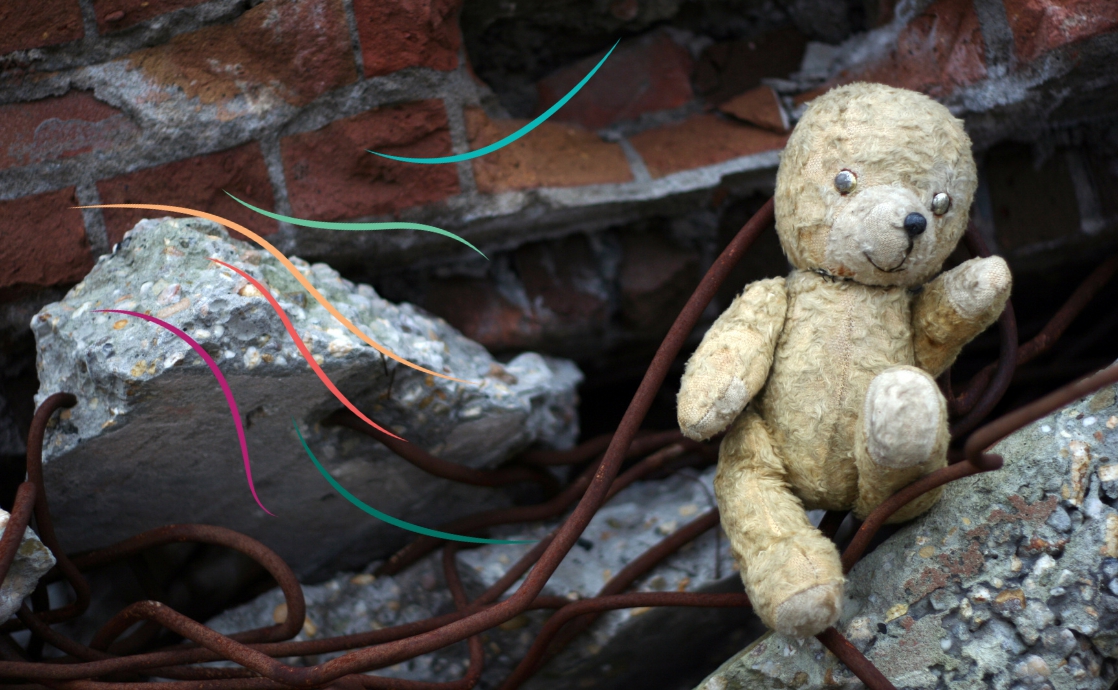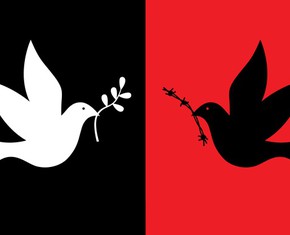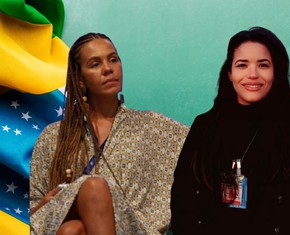The views expressed in our content reflect individual perspectives and do not represent the authoritative views of the Baha'i Faith.
On this early April morning, Russian troops made a hasty retreat from their positions around the Ukrainian capitol Kyiv, and the Western world woke up to multiple reports of horrible atrocities.
You’ve probably seen those heinous accounts. Civilians murdered, with their hands tied behind their backs. A photograph of a man on a bicycle, shot and killed for no apparent reason. Unarmed dead people lying in muddy streets, the blasted hulks of charred houses and Russian military vehicles in the background.
War crimes!, the world screams.
RELATED: Women Waging Peace
These poignant lines, from a Baha’i prayer written by Abdu’l-Baha after World War I, bear witness to these same kinds of unbearable crimes, and to the terrible consequences of all wars:
O God, my God! Thou seest how black darkness is enshrouding all regions, how all countries are burning with the flame of dissension, and the fire of war and carnage is blazing throughout the East and the West. Blood is flowing, corpses bestrew the ground, and severed heads are fallen on the dust of the battlefield.
O Lord! Have pity on these ignorant ones, and look upon them with the eye of forgiveness and pardon.
The glaring narratives about atrocities in Ukraine have generated mass outrage in the Western world. But conversely, those on the other side of the front lines will highlight the crimes and atrocities allegedly committed by Ukrainian troops and civilians. Accusations of war crimes and even genocide have already ricocheted back and forth across borders and around the world.
Predictably, governments will deny and cover up and lie about the culpability of their citizens and soldiers. They will continue, as governments that wage war always do, to demonize everyone from the opposing nation, claiming that “We fight fair, but they are evil.” “Our soldiers are brave heroes and theirs are brutal devils,” the leaders of every warring nation have said forever. “Nazis, communists, butchers, beasts, savages” – the labeling and the slander goes on.
After these allegations of atrocities, we’ll hear demands for retaliation, investigations, war crimes tribunals. Political leaders will tweet their hollow cries for justice. “Monsters! Barbarians! Inhuman animals!,” the social media echo chambers will invariably rant, calling for retaliation, more sanctions, more weapons.
Do you see where this is going? Will it solve anything? Or would these actions and accusations just increase the continuing hatred and carnage on both sides?
The Baha’i teachings look at this issue of war and its immorality in a completely different way. Baha’u’llah explicitly commanded his followers “Beware lest ye shed the blood of anyone,” outlawing nationalistic aggression and warfare. For Baha’is, all war is a crime – not just the worst actions within it. Baha’is see humanity as one entity, not as divergent groups of enemies based on ethnicity, race, or country. Baha’u’llah wrote:
These strifes and this bloodshed and discord must cease, and all men be as one kindred and one family …. Let not a man glory in this, that he loves his country; let him rather glory in this, that he loves his kind.
So Baha’is beg to differ with the outrage machine calling for revenge and hatred and more war. The soldiers on one side or the other are never the sole source of the problem. Bear with me, and I’ll explain, from my own experience.
Drafted and then immersed in my war, Vietnam, I soon saw the atrocities mount – on both sides. Unless you’ve experienced combat, you cannot imagine its ferocity, its terror, its moral injury, and its lasting impact on your very humanity. I served in the 101st Airborne Division in I Corps, near the demilitarized zone between North and South Vietnam, during 1970 and 1971. I turned 21 there one February midnight, while sitting in a ditch being attacked by Soviet-made 122mm missiles, about the size of a utility pole, spraying lethal shrapnel everywhere when they exploded.
Legally an adult, I was just a kid.
Before the rocket attack that night, many of the young soldiers in my unit tied one on. After rotating back in to base camp from a few weeks in the field, where we lost several fellow soldiers in firefights and to landmines, the troops had access to plenty of ways to get high, and they did. One of them, a medevac helicopter pilot known for his courage, sick and tired of hauling dead and injured American soldiers, stood up out of his below-ground bunker during the attack to loudly and drunkenly shake his fist and curse the North Vietnamese, and when he stood up a Russian rocket hit him in the chest. He evaporated.
This infuriated his buddies. The next day, two of them grabbed a Vietnamese man, a U.S. employee at the base PX. He was my friend – a meek civilian barber who cut G.I. hair all day. While he cut my hair, I attempted to learn a few words of Vietnamese from him, and we would laugh together about my feeble attempts. The American soldiers marched him to a low hill used by helicopter gunners to sight in their weapons. They tied him to a fencepost with wire. Within an hour, multiple U.S. choppers lifted off and strafed him for target practice. His body evaporated, too.
I recount this terrible event – just one among millions – to point out that wars run on revenge. They are chiefly fought by very young men, immature teenagers and guys in their early twenties who’ve probably watched too many war movies. Most like to think that they’ll act heroically in combat, covering themselves in glory. But combat is rarely heroic. Combat is ugly, brutal chaos. It glorifies no one. Your friends die, so you want the other guy’s friends to die, too. Bullets zip past, rockets and mortars and bombs explode and tear up the earth and its peoples, all moral strictures depart, and gory pieces of your good buddy’s viscera smear themselves across your fatigues.
Here’s how it goes: in heavy combat, soldiers quickly realize they will die. Grim acceptance follows. Once you believe you’re already dead, or soon will be dead, your ethics and your principles and your pat answers tend to go right out the window. Your soul hardens. The moral line sometimes dissolves between what you’ll do and what you won’t do to survive. Bobby or Raashad or Earl, your best friends, who once saved your life, have already been killed. You’ve watched, helpless, as they died gruesome, horrible deaths. A sense of outrage grows in you, and it becomes unbearable. Gradually, you succumb to your lower nature and its feral desire for retribution, and want nothing more than to make the enemy pay. At that point, you run the risk of becoming a monster.
This is what war does – it makes all people on the other side, not just the ones in uniform, your mortal enemies. It creates great and lasting hatred for generations. It results, inevitably, in atrocities. It sunders the human family, cleaves us violently apart, and renders us temporarily insane. That’s the real war crime – war itself. No war in human history has ever been conducted nobly, or cleanly, or without the perpetration of ugly, senseless, cruel atrocities on every side. War, in all its forms, is the atrocity.
This does not excuse those who commit atrocities in wartime – it simply recognizes their true root causes.
This payback-driven push for revenge is not just the province of young men, however. We all potentially have it within us, if pushed far enough. Witness this report, from the New York Times on April 3rd, 2022:
Ukrainian military intelligence reported that residents in Izium, a city in east Ukraine, had given Russian soldiers from the 3rd Motor Rifle Division of the Russian Federation poisoned pies, killing two and putting 28 in intensive care.
Try to imagine those grandmothers, elderly babushkas in their scarves, calmly baking their poisoned pies. Then try to imagine what you could potentially turn into if dragooned into war and brutalized and made witness to your family’s deaths and shoved far beyond the limits of what it means to be human.
RELATED: May Tyranny and Oppression Cease
Don’t get me wrong. War crimes are heinous, and must be prosecuted, as long as we start at the top and work our way down, and refrain from blaming the lowliest infantry soldiers in the thick of the fight for following the orders of the politicians and tyrants who make sure they stay far removed from the actual battle, safe in their palatial offices. After all – without war, there would be no war crimes.
The Baha’i teachings call for the establishment of a universal tribunal to stop nationalistic wars of aggression, as this passage from the writings of Abdu’l-Baha explains:
… as to religious, racial, national and political bias: all these prejudices strike at the very root of human life; one and all they beget bloodshed, and the ruination of the world. So long as these prejudices survive, there will be continuous and fearsome wars.
To remedy this condition there must be universal peace. To bring this about, a Supreme Tribunal must be established, representative of all governments and peoples; questions both national and international must be referred thereto, and all must carry out the decrees of this Tribunal.
So in the days to come, as long as this war or any war continues, we will all undoubtedly hear about more atrocities and horrible war crimes. When you do, try to resist the urge to blame individuals or entire ethnicities or regions or countries. Instead, recognize the fact that war itself is a massive crime, and those who send young people to kill one another are the real criminals.
















Comments
Sign in or create an account
Continue with Googleor